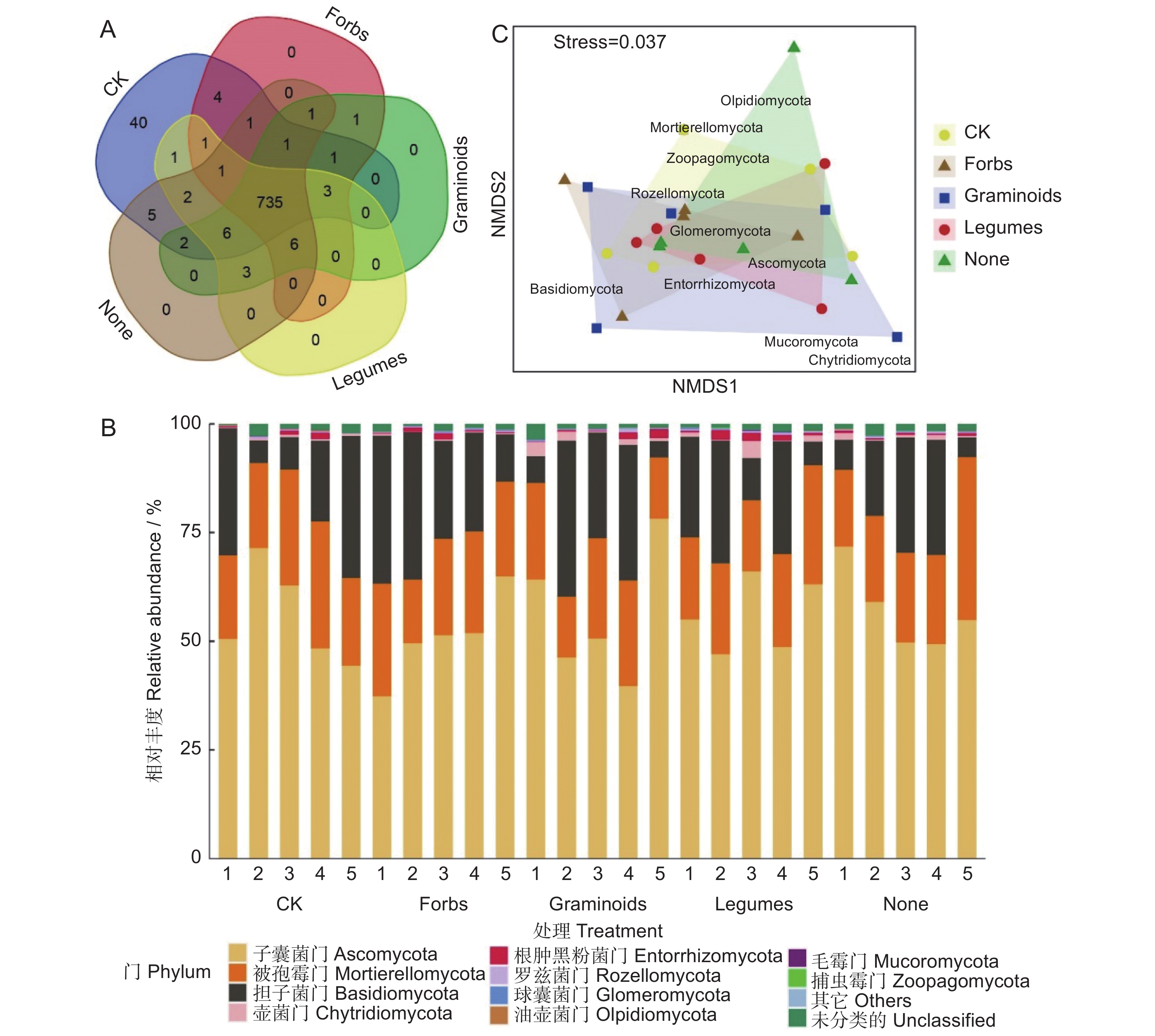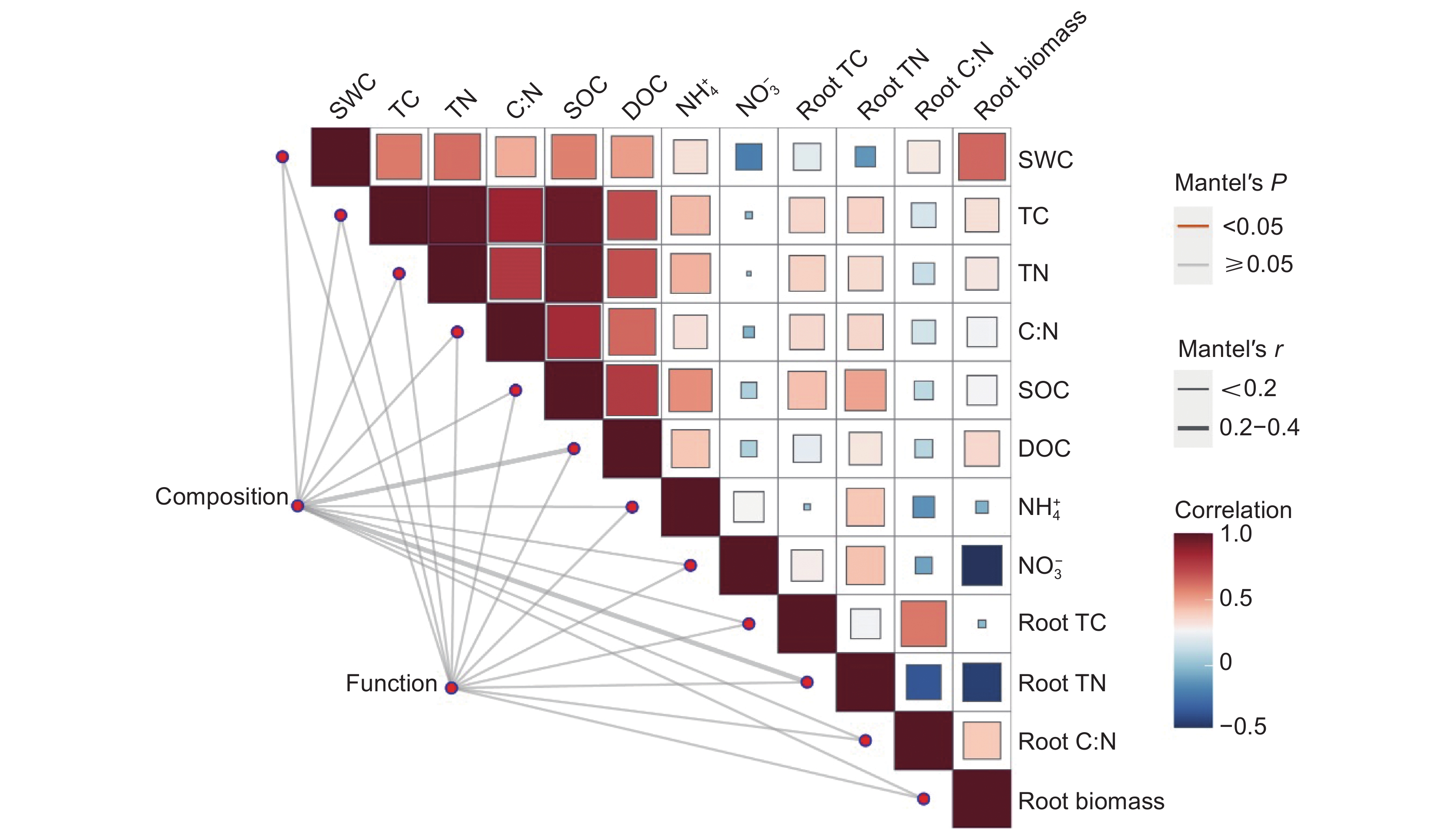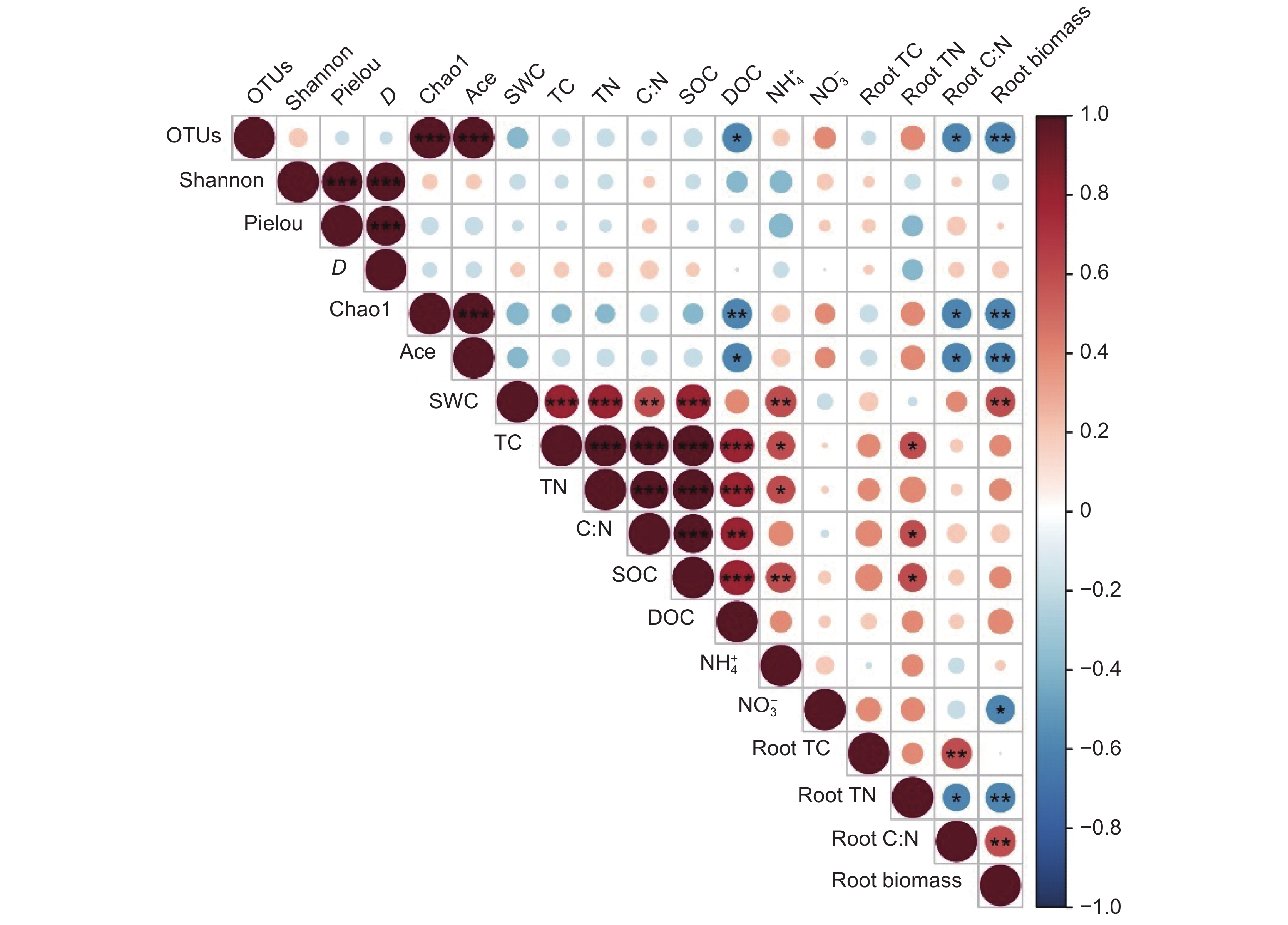Effects of plant functional groups removal on soil fungal community structure and diversity in an alpine meadow on the Qinghai-Tibet Plateau
-
摘要:
为研究植物多样性丧失对土壤真菌群落的影响,本研究在青藏高原高寒草甸进行了为期3年的植物功能群移除实验,实验共设置5个处理:不移除任何植物功能群(CK)、移除豆科和杂类草而保留禾状草、移除禾状草和杂类草而保留豆科、移除禾状草和豆科而保留杂类草以及移除所有功能群。本研究分析了高寒草甸不同植物功能群移除对根系性质、土壤理化性质的影响,并利用高通量基因测序技术分析了不同处理对土壤真菌群落结构和多样性的影响。结果显示,不同处理下均以子囊菌门、被孢霉门、担子菌门为优势类群,占土壤真菌群落的90%以上。土壤真菌群落结构和多样性在不同植物移除处理下变化不显著。球囊菌门的相对丰度在保留杂类草、保留豆科的处理中显著高于对照。捕虫霉门的相对丰度在保留豆科处理中显著高于其他处理。不同处理下土壤真菌优势功能类群为土壤腐生营养型。丛枝菌根真菌相对丰度在保留禾状草、保留豆科处理中显著高于对照。地衣寄生菌/腐生菌的相对丰度在保留杂类草处理中显著高于移除所有植物功能群处理。利用Mantel test检验,未发现土壤真菌群落结构和功能与环境因子具有显著相关性。土壤真菌丰富度与根系生物量、根系碳氮比、可溶性有机碳含量呈负相关关系。研究结果说明,青藏高原高寒草甸植物移除3年后,土壤真菌群落结构发生改变,但并未对真菌群落多样性指数产生显著影响。
Abstract:To investigate the effect of plant diversity on soil fungal communities, we conducted a three-year experiment in an alpine meadows on the Qinghai-Tibet Plateau. The experiment included five treatments: no removal, legume and forb removal, graminoid and forb removal, graminoid and legume removal, and all removal. We analyzed soil fungal abundance and diversity using high-throughput sequencing, and measured root and soil properties. Results showed that Ascomycota, Mortierellomycota, and Basidiomycota were the dominant fungal phyla in the different treatments, accounting for more than 90%. There were no significant differences in composition and alpha diversity indices of the fungal communities under different treatments. The relative abundance of Glomeromycota was increased under graminoid and forb removal and graminoid and legume removal. Compared to the other treatments, the removal of graminoids and forbs increased the relative abundance of Zoopagomycota. The dominant fungal functional group was soil saprotroph fungi in all treatments. The relative abundance of arbuscular mycorrhizal fungi was increased under legume and forb removal and graminoid and forb removal. Compared with the removal of all, the removal of graminoids and legumes increased the relative abundance of lichen parasites/saprotroph fungi. The Mantel test showed no clear correlation between soil fungal community composition and function and environmental factors. Soil fungal richness indices were negatively affected by the increase in root biomass, root carbon:nitrogen (C:N), and dissolved organic carbon. Overall, our results indicate that the removal of plant functional groups in alpine meadows on the Qinghai-Tibet Plateau has a significant effect on soil fungal community structure but not on fungal community diversity.
-
Keywords:
- Alpine meadow /
- Plant functional group removal /
- Soil fungi /
- Plant-soil interaction
-
-
图 2 不同植物功能群移除下土壤真菌群落结构组成
A:不同处理土壤真菌OTUs的Venn图;B:不同样品的门水平土壤真菌群落结构组成;C:不同处理下门水平的土壤真菌群落NMDS图。CK:不移除;Forbs:移除禾状草和豆科而保留杂类草;Graminoids:移除豆科和杂类草而保留禾状草;Legumes:移除禾状草和杂类草而保留豆科;None:移除所有植物功能群。
Figure 2. Soil fungal community composition under removal of different plant functional groups
A: Venn diagram of soil fungal OTUs in different treatments; B: Phylum-level soil fungal community composition in different samples; C: NMDS diagram of phylum-level soil fungal community in different treatments. CK: No removals; Forbs: Removal of graminoids and legumes; Graminoids: Removal of legumes and forbs; Legumes: Removal of graminoids and forbs; None: Removal of all.
图 3 环境因子对土壤真菌群落结构和功能的影响(Mantel test)
SWC:土壤含水率;TC:总碳;TN:总氮;C:N:碳氮比;SOC:土壤有机碳;DOC:可溶性有机碳;NH+4-N:铵态氮;NO−3-N:硝态氮;Root TC:根总碳;Root TN:根总氮;Root C:N:根系碳氮比;Root biomass:根系生物量。下同。
Figure 3. Effects of environmental factors on soil fungal community composition and function
SWC: Soil water content; TC: Total carbon; TN: Total nitrogen; C:N: Carbon-to-nitrogen ratio; SOC: Soil organic carbon; DOC: Dissolved organic carbon; NH+4-N: Ammonium nitrogen; NO−3-N: Nitrate nitrogen. Root TC: Root total carbon; Root TN: Root total nitrogen; Root C:N: Root carbon-to-nitrogen ratio. Same below.
图 4 土壤真菌多样性与环境因子相关性分析
OTUs:操作分类单位;Shannon:香农指数;Pielou:均匀度指数; D:辛普森指数;Chao1:描述样品中所含OTUs数目的指数;Ace:样本中物种组成的丰富度和均匀度。
Figure 4. Correlation of soil fungal diversity and environmental factors
OTUs: Operational taxonomic units; Shannon: Shannon-Wiener index; Pielou: Pielou’s evenness index; D: Simpson index; Chao1: An index describing the number of OTUs contained in a sample; Ace: An index describing the richness and evenness of species composition in a sample.
表 1 不同植物功能群移除下根系性质
Table 1 Root properties under removal of different plant functional groups
指标Index CK Forbs Graminoids Legumes None 根总碳 / g/kg 332.0 ± 6.0a 275.6 ± 7.8a 279.1 ± 31.1a 271.2 ± 29.4a 300.3 ± 27.0a 根总氮 / g/kg 8.91 ± 0.85a 8.63 ± 0.74a 8.14 ± 0.25a 9.04 ± 0.65a 9.43 ± 0.49a 根系碳氮比 34.04 ± 5.44a 32.85 ± 2.76a 34.59 ± 4.35a 30.13 ± 2.81a 31.80 ± 2.13a 根系生物量 / kg/m2 0.68 ± 0.23a 0.85 ± 0.20a 0.77 ± 0.12a 0.72 ± 0.16a 0.54 ± 0.15a 注:同行不同小写字母表示在0.05水平上差异显著。CK:不移除;Forbs:移除禾状草和豆科而保留杂类草;Graminoids:移除豆科和杂类草而保留禾状草;Legumes:移除禾状草和杂类草而保留豆科;None:移除所有植物功能群。下同。 Notes: Different lowercase letters in the same row indicate significant differences at the 0.05 level. CK: No removals; Forbs: Removal of graminoids and legumes; Graminoids: Removal of legumes and forbs; Legumes: Removal of graminoids and forbs; None: Removal of all. Same below. 表 2 不同植物功能群移除下土壤理化性质
Table 2 Soil properties under removal of different plant functional groups
指标Index CK Forbs Graminoids Legumes None 土壤含水率 / % 54.72 ± 2.18a 55.10 ± 5.30a 54.91 ± 3.92a 50.80 ± 5.10a 51.86 ± 4.87a 总碳 / g/kg 65.05 ± 3.50a 67.44 ± 5.89a 60.38 ± 4.65a 64.97 ± 6.68a 61.19 ± 5.66a 总氮 / g/kg 5.85 ± 0.25a 6.08 ± 0.45a 5.53 ± 0.36a 5.82 ± 0.48a 5.56 ± 0.43a 碳氮比 11.09 ± 0.14a 11.06 ± 0.16a 10.89 ± 0.19a 11.09 ± 0.24a 10.96 ± 0.18a 土壤有机碳 / g/kg 67.72 ± 3.34a 67.15 ± 5.43a 60.60 ± 4.97a 63.01 ± 5.60a 62.43 ± 5.92a 可溶性有机碳 / mg/kg 309.4 ± 19.8a 309.1 ± 25.4a 263.9 ± 15.0a 286.2 ± 14.5a 269.3 ± 11.3a 铵态氮 / mg/kg 8.79 ± 1.16a 9.33 ± 0.45a 9.80 ± 1.88a 8.45 ± 1.58a 9.55 ± 1.23a 硝态氮 / mg/kg 6.10 ± 0.94a 5.22 ± 0.68a 4.76 ± 0.32a 4.14 ± 0.60a 6.62 ± 0.99a 表 3 不同植物功能群移除下门水平土壤真菌相对丰度 / %
Table 3 Relative abundance of soil fungi at the phylum level under removal of different plant functional groups / %
门Phylum CK Forbs Graminoids Legumes None 子囊菌门 55.49 ± 5.04a 51.01 ± 4.37a 55.78 ± 6.89a 55.97 ± 3.79a 56.97 ± 4.11a 被孢霉门 22.98 ± 2.07a 21.58 ± 1.88a 19.53 ± 2.27a 20.97 ± 1.83a 23.17 ± 3.61a 担子菌门 18.67 ± 5.55a 24.84 ± 4.32a 20.27 ± 6.52a 18.51 ± 4.59a 16.38 ± 4.66a 壶菌门 0.39 ± 0.06a 0.24 ± 0.06a 1.54 ± 0.52a 1.35 ± 0.69a 0.78 ± 0.26a 根肿黑粉菌门 0.53 ± 0.28a 0.65 ± 0.23a 0.83 ± 0.40a 1.27 ± 0.37a 0.43 ± 0.07a 罗兹菌门 0.16 ± 0.06a 0.18 ± 0.01a 0.28 ± 0.14a 0.30 ± 0.04a 0.27 ± 0.06a 球囊菌门 0.05 ± 0.02b 0.19 ± 0.04a 0.17 ± 0.02ab 0.18 ± 0.05a 0.11 ± 0.02ab 油壶菌门 0.15 ± 0.05a 0.08 ± 0.02a 0.08 ± 0.02a 0.06 ± 0.01a 0.12 ± 0.02a 毛霉门 0.06 ± 0.01a 0.03 ± 0.01a 0.03 ± 0.01a 0.10 ± 0.04a 0.02 ± 0.00a 捕虫霉门 0.01 ± 0.00b 0.01 ± 0.00b 0.01 ± 0.00b 0.03 ± 0.01a 0.01 ± 0.00b 表 4 不同植物功能群移除下土壤真菌多样性
Table 4 Soil fungal diversity under removal of different plant functional groups
指数Index CK Forbs Graminoids Legumes None OTUs 585.2 ± 47.2a 633 ± 39.7a 664.8 ± 7.2a 660 ± 11.7a 671.6 ± 6.1a H 4.19 ± 0.20a 4.13 ± 0.11a 4.10 ± 0.12a 4.18 ± 0.10a 4.26 ± 0.07a Pielou 0.66 ± 0.03a 0.64 ± 0.01a 0.63 ± 0.02a 0.64 ± 0.01a 0.66 ± 0.01a D 0.96 ± 0.01a 0.95 ± 0.01a 0.94 ± 0.01a 0.95 ± 0.01a 0.95 ± 0.01a Chao1 617.57 ± 45.20a 672.76 ± 34.79a 699.08 ± 9.69a 698.73 ± 8.42a 699.74 ± 3.97a Ace 613.88 ± 44.54a 661.72 ± 37.37a 697.51 ± 8.34a 693.77 ± 8.52a 696.92 ± 4.74a 注:OTUs,操作分类单位;Ace,样本中物种组成的丰富度和均匀度;Chao1,描述样品中所含OTUs数目的指数;D,辛普森指数;Pielou,均匀度指数; H,香农指数。 Notes: OTUs, operational taxonomic units; Ace index, species composition richness and evenness in a sample; Chao1 index, number of OTUs in a sample; D, Simpson index; Pielou, Pielou’s evenness index; H, Shannon-Wiener index. 表 5 不同植物功能群移除下土壤真菌功能类群相对丰度 / %
Table 5 Relative abundance of soil fungal functional groups under removal of different plant functional groups / %
功能类群 Functional group CK Forbs Graminoids Legumes None 动物寄生真菌/病原菌 6.75 ± 3.09a 7.97 ± 3.28a 3.19 ± 0.46a 3.48 ± 0.60a 5.73 ± 2.23a 丛枝菌根真菌 0.10 ± 0.03b 0.31 ± 0.07ab 0.32 ± 0.03a 0.33 ± 0.09a 0.22 ± 0.04ab 粪腐生真菌 7.25 ± 1.12a 3.11 ± 1.38a 4.19 ± 1.38a 5.32 ± 4.02a 4.26 ± 0.61a 外生菌根真菌 6.75 ± 5.17a 0.10 ± 0.03a 0.12 ± 0.05a 0.13 ± 0.03a 0.23 ± 0.13a 内生真菌 0.36 ± 0.06a 0.49 ± 0.21a 0.42 ± 0.07a 0.39 ± 0.08a 0.78 ± 0.11a 真菌寄生菌 1.61 ± 0.62a 0.44 ± 0.05a 0.99 ± 0.25a 0.92 ± 0.39a 1.15 ± 0.45a 叶腐生菌 5.15 ± 0.67a 3.44 ± 0.42a 9.50 ± 3.62a 5.72 ± 1.83a 7.00 ± 1.15a 地衣寄生菌/腐生菌 1.15 ± 0.40ab 1.53 ± 0.49a 0.47 ± 0.10ab 0.81 ± 0.24ab 0.28 ± 0.06b 兰花菌根真菌 0.08 ± 0.04a 0.09 ± 0.05a 0.22 ± 0.07a 0.17 ± 0.09a 0.10 ± 0.06a 植物病原菌/腐生菌 8.15 ± 2.10a 5.24 ± 0.48a 5.87 ± 0.74a 9.37 ± 1.65a 8.76 ± 1.80a 土壤腐生菌 35.64 ± 2.13a 36.85 ± 4.02a 44.49 ± 5.56a 41.82 ± 5.81a 37.26 ± 4.39a 木质腐生菌 2.34 ± 0.23a 2.30 ± 0.27a 3.33 ± 0.80a 3.53 ± 0.69a 3.81 ± 0.69a 未定义腐生菌 24.67 ± 4.47a 38.14 ± 5.48a 26.90 ± 8.90a 28.01 ± 5.38a 30.42 ± 6.67a -
[1] Myers N,Mittermeier RA,Mittermeier CG,da Fonseca GAB,Kent J. Biodiversity hotspots for conservation priorities[J]. Nature,2000,403 (6772):853−858. doi: 10.1038/35002501
[2] 徐满厚,刘敏,翟大彤,薛娴,彭飞,尤全刚. 青藏高原高寒草甸生物量动态变化及与环境因子的关系——基于模拟增温实验[J]. 生态学报,2016,36(18):5759−5767. Xu MH,Liu M,Zhai DT,Xue X,Peng F,You QG. Dynamic changes in biomass and its relationship with environmental factors in analpine meadow on the Qinghai-Tibetan Plateau,based on simulated warming experiments[J]. Acta Ecologica Sinica,2016,36 (18):5759−5767.
[3] 姜林,胡骥,杨振安,詹伟,赵川,等. 植物功能群去除对高寒草甸群落结构、多样性及生产力的影响[J]. 生态学报,2021,41(4):1402−1411. Jiang L,Hu J,Yang ZA,Zhan W,Zhao C,et al. Effects of plant functional group removal on community structure,diversity and production in Alpine meadow[J]. Acta Ecologica Sinica,2021,41 (4):1402−1411.
[4] 张中华,周华坤,赵新全,姚步青,马真,等. 青藏高原高寒草地生物多样性与生态系统功能的关系[J]. 生物多样性,2018,26(2):111−129. doi: 10.17520/biods.2017021 Zhang ZH,Zhou HK,Zhao XQ,Yao BQ,Ma Z,et al. Relationship between biodiversity and ecosystem functioning in alpine meadows of the Qinghai-Tibet Plateau[J]. Biodiversity Science,2018,26 (2):111−129. doi: 10.17520/biods.2017021
[5] 郝爱华,薛娴,彭飞,尤全刚,廖杰,等. 青藏高原典型草地植被退化与土壤退化研究[J]. 生态学报,2020,40(3):964−975. Hao AH,Xue X,Peng F,You QG,Liao J,et al. Different vegetation and soil degradation characteristics of a typical grassland in the Qinghai-Tibetan Plateau[J]. Acta Ecologica Sinica,2020,40 (3):964−975.
[6] 刘育红,魏卫东,杨元武,张英. 三江源区退化高寒草甸植物功能群特征[J]. 江苏农业科学,2019,47(1):286−291. Liu YH,Wei WD,Yang YW,Zhang Y. Characteristics of plant functional groups of degraded alpine meadow in the Source Region of Three Rivers,China[J]. Jiangsu Agricultural Sciences,2019,47 (1):286−291.
[7] 姜炎彬,张扬建. 西藏天然草地植物功能群分布的初步研究[J]. 植物科学学报,2016,34(2):220−229. Jiang YB,Zhang YJ. Distribution of plant functional groups in the natural grasslands of Xizang,China[J]. Plant Science Journal,2016,34 (2):220−229.
[8] Wu GL,Du GZ,Liu ZH,Thirgood S. Effect of fencing and grazing on a Kobresia-dominated meadow in the Qinghai-Tibetan Plateau[J]. Plant Soil,2009,319 (1-2):115−126. doi: 10.1007/s11104-008-9854-3
[9] Klein JA,Harte J,Zhao XQ. Decline in medicinal and forage species with warming is mediated by plant traits on the Tibetan Plateau[J]. Ecosystems,2008,11 (5):775−789. doi: 10.1007/s10021-008-9160-1
[10] 于海玲,樊江文,钟华平,李愈哲. 青藏高原区域不同功能群植物氮磷生态化学计量学特征[J]. 生态学报,2017,37(11):3755−3764. Yu HL,Fan JW,Zhong HP,Li YZ. Characteristics of N and P stoichiometry of plants in different functional groups in the Qinghai-Tibet Plateau regions[J]. Acta Ecologica Sinica,2017,37 (11):3755−3764.
[11] Wang J,Wang XT,Liu GB,Wang GL,Zhang C. Grazing-to-fencing conversion affects soil microbial composition,functional profiles by altering plant functional groups in a Tibetan alpine meadow[J]. Appl Soil Ecol,2021,166:104008. doi: 10.1016/j.apsoil.2021.104008
[12] 薛凯,张彪,周姝彤,冉沁蔚,唐立,等. 青藏高原高寒草地土壤微生物群落及影响因子[J]. 科学通报,2019,64(27):2915−2927. doi: 10.1360/TB-2019-0090 Xue K,Zhang B,Zhou ST,Ran QW,Tang L,et al. Soil microbial communities in alpine grasslands on the Tibet Plateau and their influencing factors[J]. Chinese Science Bulletin,2019,64 (27):2915−2927. doi: 10.1360/TB-2019-0090
[13] 肖颖,吉使阿微,赵文学,田莉华. 青藏高原东缘不同人工草地土壤养分、酶活性及微生物生物量特征[J]. 中国草地学报,2022,44(9):90−99. Xiao Y,Jishi AW,Zhao WX,Tian LH. Soil nutrients,enzyme activities and microbial biomass characteristics of different artificial grasslands in the eastern margin of the Qinghai-Tibetan Plateau[J]. Chinese Journal of Grassland,2022,44 (9):90−99.
[14] 姜鑫. 植物物种多样性对土壤微生物群落的影响: 以高寒草地为例[D]. 南京: 南京大学, 2021: 27-45. [15] 赵文,尹亚丽,李世雄,王玉琴,王彦龙. 三江源区退化高寒草甸土壤真菌群落特征[J]. 应用生态学报,2021,32(3):869−877. Zhao W,Yin YL,Li SX,Wang YQ,Wang YL. The characteristics of soil fungal community in degraded alpine meadow in the Three Rivers Source Region,China[J]. Chinese Journal of Applied Ecology,2021,32 (3):869−877.
[16] Orwin KH,Wardle DA. Plant species composition effects on belowground properties and the resistance and resilience of the soil microflora to a drying disturbance[J]. Plant Soil,2005,278 (1-2):205−221. doi: 10.1007/s11104-005-8424-1
[17] Connell RK,Zeglin LH,Blair JM. Plant legacies and soil microbial community dynamics control soil respiration[J]. Soil Biol Biochem,2021,160:108350. doi: 10.1016/j.soilbio.2021.108350
[18] Gui WY,Ren HY,Liu N,Zhang YJ,Cobb AB,et al. Plant functional group influences arbuscular mycorrhizal fungal abundance and hyphal contribution to soil CO2 efflux in temperate grasslands[J]. Plant Soil,2018,432 (1-2):157−170. doi: 10.1007/s11104-018-3789-0
[19] Chen DM,Pan QM,Bai YF,Hu SJ,Huang JH,et al. Effects of plant functional group loss on soil biota and net ecosystem exchange:a plant removal experiment in the Mongolian grassland[J]. J Ecol,2016,104 (3):734−743. doi: 10.1111/1365-2745.12541
[20] Jongen R,Hannula SE,de Long JR,Heinen R,Huberty M,et al. Plant community legacy effects on nutrient cycling,fungal decomposer communities and decomposition in a temperate grassland[J]. Soil Biol Biochem,2021,163:108450. doi: 10.1016/j.soilbio.2021.108450
[21] Francioli D,van Rijssel SQ,van Ruijven J,Termorshuizen AJ,Cotton TEA,et al. Plant functional group drives the community structure of saprophytic fungi in a grassland biodiversity experiment[J]. Plant Soil,2021,461 (1-2):91−105. doi: 10.1007/s11104-020-04454-y
[22] Chen WJ,Zhou HK,Wu Y,Wang J,Zhao ZW,et al. Loss of plant functional groups impacts soil carbon flow by changing multitrophic interactions within soil micro-food webs[J]. Appl Soil Ecol,2022,178:104566. doi: 10.1016/j.apsoil.2022.104566
[23] Strecker T,Macé OG,Scheu S,Eisenhauer N. Functional composition of plant communities determines the spatial and temporal stability of soil microbial properties in a long-term plant diversity experiment[J]. Oikos,2016,125 (12):1743−1754. doi: 10.1111/oik.03181
[24] 宛倩. 高寒草甸不同恢复方式对土壤微生物群落的影响[D]. 杨凌: 西北农林科技大学, 2022: 60-64. [25] 温杨雪,赵博,罗巧玉,贾云龙,冯涛,王强. 青藏高原高寒草地AM真菌分布及其对近自然恢复的生态作用[J]. 菌物学报,2021,40(10):2562−2578. Wen YX,Zhao B,Luo QY,Jia YL,Feng T,Wang Q. Distribution and ecological role in close-to-nature restoration of arbuscular mycorrhizal fungi in Tibetan Plateau alpine grassland[J]. Mycosystema,2021,40 (10):2562−2578.
[26] 王浩,吴爱姣,刘保兴,刘润进,陈应龙. 菌根真菌多样性与植物多样性的相互作用研究进展[J]. 微生物学通报,2020,47(11):3918−3932. Wang H,Wu AJ,Liu BX,Liu RJ,Chen YL. Interactions between mycorrhizal fungal diversity and plant diversity:a review[J]. Microbiology China,2020,47 (11):3918−3932.
[27] Wang P,Guo J,Xu XY,Yan XB,Zhang KC,et al. Soil acidification alters root morphology,increases root biomass but reduces root decomposition in an alpine grassland[J]. Environ Pollut,2020,265:115016. doi: 10.1016/j.envpol.2020.115016
[28] Luo YJ,Qin GL,Du GZ. Importance of assemblage-level thinning:a field experiment in an alpine meadow on the Tibet plateau[J]. J Veg Sci,2006,17 (4):417−424.
[29] 刘旻霞,朱柯嘉. 青藏高原东缘高寒草甸不同功能群植物氮磷化学计量特征研究[J]. 中国草地学报,2013,35(2):52−58. doi: 10.3969/j.issn.1673-5021.2013.02.010 Liu MX,Zhu KJ. Characteristics of nitrogen and phosphorus stoichiometry of plants in different functional groups on alpine meadow in the eastern edge of Tibetan plateau[J]. Chinese Journal of Grassland,2013,35 (2):52−58. doi: 10.3969/j.issn.1673-5021.2013.02.010
[30] 张国龙. 大针茅群落物种丰富度和功能多样性对混合凋落物分解特征的影响[D]. 呼和浩特: 内蒙古大学, 2019: 21-23. [31] 马百兵,孙建,朱军涛,罗广祥. 藏北高寒草地植物群落C、N化学计量特征及其影响因素[J]. 生态学杂志,2018,37(4):1026−1036. Ma BB,Sun J,Zhu JT,Luo GX. Carbon and nitrogen stoichiometry of plant community and its influencing factors in a northern Tibet alpine grassland[J]. Chinese Journal of Ecology,2018,37 (4):1026−1036.
[32] Li WJ,Zhang RL,Liu SS,Li WX,Li JH,et al. Effect of loss of plant functional group and simulated nitrogen deposition on subalpine ecosystem properties on the Tibetan Plateau[J]. Sci Total Environ,2018 (631-632):289−297. doi: 10.1016/j.scitotenv.2018.02.287
[33] Marshall CB,Mclaren JR,Turkington R. Soil microbial communities resistant to changes in plant functional group composition[J]. Soil Biol Biochem,2011,43 (1):78−85. doi: 10.1016/j.soilbio.2010.09.016
[34] Van der Wal A,van Veen JA,Smant W,Boschker HTS,Bloem J,et al. Fungal biomass development in a chronosequence of land abandonment[J]. Soil Biol Biochem,2006,38 (1):51−60. doi: 10.1016/j.soilbio.2005.04.017
[35] 于贵瑞,伏玉玲,孙晓敏,温学发,张雷明. 中国陆地生态系统通量观测研究网络(ChinaFLUX)的研究进展及其发展思路[J]. 中国科学D辑:地球科学,2006,36(S1):1−21. [36] 赵兴鸽,张世挺,牛克昌. 青藏高原高寒草甸土壤真菌多样性与植物群落功能性状和土壤理化特性的关系[J]. 应用与环境生物学报,2020,26(1):1−9. Zhao XG,Zhang ST,Niu KC. Relationships between soil fungal diversity,plant community functional traits,and soil attributes in Tibetan alpine meadows[J]. Chinese Journal of Applied and Environmental Biology,2020,26 (1):1−9.
[37] 李海云,姚拓,高亚敏,张建贵,马亚春,等. 退化高寒草地土壤真菌群落与土壤环境因子间相互关系[J]. 微生物学报,2019,59(4):678−688. Li HY,Yao T,Gao YM,Zhang JG,Ma YC,et al. Relationship between soil fungal community and soil environmental factors in degraded alpine grassland[J]. Acta Microbiologica Sinica,2019,59 (4):678−688.
[38] Liu YJ,Shi GX,Mao L,Cheng G,Jiang SJ,et al. Direct and indirect influences of 8 yr of nitrogen and phosphorus fertilization on Glomeromycota in an alpine meadow ecosystem[J]. New Phytol,2012,194 (2):523−535. doi: 10.1111/j.1469-8137.2012.04050.x
[39] 王幼珊,刘润进. 球囊菌门丛枝菌根真菌最新分类系统菌种名录[J]. 菌物学报,2017,36(7):820−850. Wang YS,Liu RJ. A checklist of arbuscular mycorrhizal fungi in the recent taxonomic system of Glomeromycota[J]. Mycosystema,2017,36 (7):820−850.
[40] Corsaro D,Köhsler M,Wylezich C,Venditti D,Walochnik J,Michel R. New insights from molecular phylogenetics of amoebophagous fungi (Zoopagomycota,Zoopagales)[J]. Parasitol Res,2018,117 (1):157−167. doi: 10.1007/s00436-017-5685-6
[41] Yang T,Adams JM,Shi Y,He JS,Jing X,et al. Soil fungal diversity in natural grasslands of the Tibetan Plateau:associations with plant diversity and productivity[J]. New Phytol,2017,215 (2):756−765. doi: 10.1111/nph.14606
[42] 刘安榕,杨腾,徐炜,上官子健,王金洲,等. 青藏高原高寒草地地下生物多样性:进展、问题与展望[J]. 生物多样性,2018,26(9):972−987. doi: 10.17520/biods.2018119 Liu AR,Yang T,Xu W,Shangguan ZJ,Wang JZ,et al. Status,issues and prospects of belowground biodiversity on the Tibetan alpine grassland[J]. Biodiversity Science,2018,26 (9):972−987. doi: 10.17520/biods.2018119
[43] 江奥,敬路淮,泽让东科,田黎明. 放牧影响草地凋落物分解研究进展[J]. 草业学报,2023,32(4):208−220. Jiang A,Jing LH,Mipam TD,Tian LM. Progress in research on the effects of grazing on grassland litter decomposition[J]. Acta Prataculturae Sinica,2023,32 (4):208−220.
[44] 王敏. 亚热带森林景观中可溶性有机碳的特征及土壤截存机制[D]. 北京: 中国科学院大学, 2019: 70-72. [45] Leff JW,Bardgett RD,Wilkinson A,Jackson BG,Pritchard WJ,et al. Predicting the structure of soil communities from plant community taxonomy,phylogeny,and traits[J]. ISME J,2018,12 (7):1794−1805. doi: 10.1038/s41396-018-0089-x
[46] Kang BT,Bowatte S,Hou FJ. Soil microbial communities and their relationships to soil properties at different depths in an alpine meadow and desert grassland in the Qilian mountain range of China[J]. J Arid Environ,2021,184:104316. doi: 10.1016/j.jaridenv.2020.104316




 下载:
下载:



